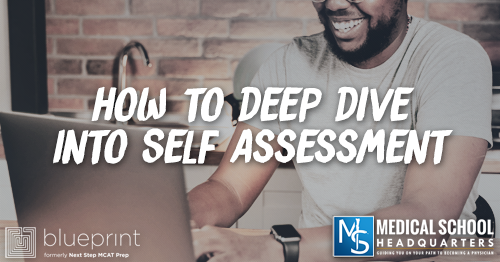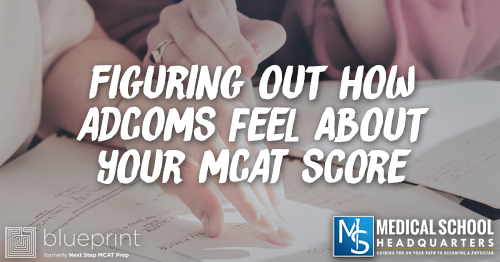Apple Podcasts | Google Podcasts

Session 168
Today, we’re hitting some of the high notes, which are things students find very confusing and very complex. Let’s tackle some MCAT definitions: Do you know the different heuristics? How about the different types of memory? Join us for some psych/soc. We have a fun episode today!
We’re joined once again by Phil from Blueprint MCAT (formerly Next Step Test Prep). Our goal is to help you on this journey to medical school so you can one day call yourself a physician. Find more resources on Meded Media, including The Premed Years Podcast.
[03:10] Heuristic
Heuristic is like a mental shortcut for solving some sort of problem. There are two different types of heuristics: representativeness heuristic and availability heuristics.
An example of availability heuristics:
You come home and try to turn on your lights in your kitchen. You put the light switch on and nothing happens. What is your first thought process to fix this?
First, you go to see if the lights are working. Then you’d check the bulb and the breaker. Based on experience, you have an idea that the lights don’t work because of breakers or the light bulb has burnt. Others would tell somebody to fix it and that’s what experience tells you how to fix it.
You have this ordered list based on your experience. And yours may be separate from anybody else’s.
Another example would be this idea I got from a podcast I listened to. It talked about how IQ tests are biased towards people who look like who wrote the test. They gave an example of what would you do if you find a wallet in a store.
A stereotypical person creating this test would most likely say they’d pick it up and give it to a cashier. But then an African-American or those coming from underprivilege or disadvantaged background would say they wouldn’t touch it otherwise people would assume they took it. It’s amazing how much thought process goes into this.
An example of availability heuristic:
Sometimes, you don’t have experience with something and you’d find yourself in problems you’ve never come across.
Representative heuristic is built around your conceptual understanding. You have some idea of what’s going on with the process. So it’s conceptual rather than experiential.
Based on the light switch example above, there are a lot of people that are going to switch the light bulb. And they don’t necessarily understand what it means when a light bulb is burned out. It’s not built around their understanding but around their experience.
With a representative heuristic, imagine a person who grew up in a place without electricity. But somehow, they’ve gotten hold of an electrical engineering textbook. They read it. They put the light switch on and nothing happens.
Their thought process of how to solve this is going to be different than yours. It can be along the lines of maybe this is an alternating circuit but the light bulb is designed for a direct circuit. Or perhaps the wires are the wrong gauge. They’re too thin. As a result, the resistance is high enough. There’s not enough electricity going through it.
Or maybe the wires have been wired up incorrectly. There are too many things wired in the series that decreases the current because the resistance skyrockets. The thought process is different here but it’s still a way to solve the problem.
'It's not that the one is better than the other. They're just two different ways of solving any sort of problem that comes up.'Click To Tweet[11:57] Memory Type 1: Sensory Memory
The big three branches of the types of memory are sensory memory, short-term memory, and long-term memory. These last two were the first to be discovered. And then sensory memory was discovered which turns out to be the shortest. So short-term memory should have been called “mid-term” and sensory called short-term.
'Somebody screwed up... it turns out that sensory memory is actually the shortest.'Click To TweetSensory memory is the idea that your brain holds on to sensory information as it comes in. It holds onto it long enough for you to stitch it together so you can interpret what actually is going on. This happens with all your senses.
The best evidence for sensory memory is the double-take. You look at something and look away and then you realize it’s Keannu Reeves fighting a polar bear so you look again.
1.1 Iconic Sensory Memory
This is a type of memory based on icons or visual things. It’s like your brain is holding onto this sensory information as it’s coming in. It’s taking a while to process but it’s still holding on to this sensory memory. This allows you to do the double-take and process things going through there.
1.2 Echoic Sensory Memory
This is based on sound. For example, someone is mumbling or talking with a very thick accent. They said something and it took you a second to understand. So you were holding onto those sounds in your head in trying to make sense of them and trying to figure out what the words meant.
1.3 Haptic Sensory Memory
This refers to touch. It’s not as important for most people, but it’s huge for blind people if you’re reading the Braille. You run your fingers across a series of bumps. You’ve got to remember what bumps you just touched so you can remember what the next bumps are going to be.
To recap, sensory is the shortest of them. There’s iconic, echoic, and haptic – seeing hearing, and touching. They all last less than a second, just as your brain is holding onto the sensory information as it comes in.
[15:50] Memory Type 2: Short-Term Memory
Short-term memory lasts a little bit less than a minute.
2.1 Working Memory
This is a branch of short-term memory. It’s a type of memory that requires work. Imagine a scenario that if you don’t answer this question correctly, you’re going to die. It all has to be done in your head. And the question is what’s 286 divided by 13?
Then you were able to answer it immediately. So you’re using working memory. It requires active input.
2.1.a. Visuospatial sketch pad
It’s like your head has this whiteboard and you’re writing things and holding onto that. And if someone asks you for your phone number in the middle of solving, you’d have to restart.
'Working memory requires work.'Click To TweetFor most people with short-term working memory, the limit is about 7 digits if you’re dealing with numbers. It’s an interesting thing as the MCAT may occasionally want to test that.
2.1.b. Phonological loop
For example, someone gave you their phone number but you don’t have your pen with you. You need to hold onto this in your brain so you keep on saying the numbers in your head.
When you say it, that will restore it in your short-term memory and then you can say it again and restore it in your short-term memory. It’s this loop where you’re holding onto something in your short-term memory.
Once again, this requires active input. If somebody asks you to do a math problem in the middle of it then you’ve lost the number.
[19:27] Memory Type 3: Long-Term Memory
'People, in general, don't appreciate how awesome long-term memory is.'Click To TweetLong-term memory is super awesome. Some can be 110 years old and they still remember their 10th birthday party.
3.1 Explicit Memory
These are things you can explain. It’s also called “declarative memory” because you can declare it.
3.1.a Episodic
It’s like an episode of your life. It’s an experiential thing.
3.1.b Semantic
It’s based on fact. For instance, knowing that lysine is a basic amino acid is a fact. It’s not based on experience but on something you just know.
3.2 Implicit Memory
These are things you can’t really explain. They’re implied. For instance, you’re not born knowing how to walk. It’s a memory-based thing. You’ve learned how to do this and you remember how to do it. The same thing with learning how to talk.
So implicit memory is knowing implied things below the surface. They’re often called procedural memory.
They’re also stored in a different region of the brain. A lot of the long-term memory types are stored in the hippocampal region. The MCAT will test this. But a lot of the procedural memories are based on the cerebellum, like muscle memory.
'Procedural memories are probably one of the most annoying for patients.'Click To TweetLosing your procedural memory can be very annoying. Not remembering your fifth-grade teacher is less annoying than if you’ve forgotten how to eat or speak or walk. Especially because you’ve put in zero effort to do any of that before as those were all implicit.
[24:00] A Great Strategy for Students
If you find yourself hitting that wall of “you can no longer any more of this stuff,” think about maybe hijacking a different sort of memory. Instead of trying to memorize stuff in a semantic, explicit way, try to switch and memorize something as an episodic thing and create a story or experience.
A lot of people will feel they’ve hit a wall, feeling they can’t cram any more stuff. So you have to store it in a different way. Coming up with stories which are episodic memories.
Or use songs for your procedural memories. For instance, learning to recite the alphabet backward. Perhaps, you can do that with all the amino acids where you can just scout them off that quickly in a “sing-a-song” way. Knowing how this all works can help you lock away the secrets of the MCAT.
'Store this memory in a different region of the brain, the one that doesn't fill up as much if you find yourself full in your semantic memory region.'Click To Tweet[26:26] Distinguishing Which is Which on the MCAT
'The MCAT is not going to ask just for straight-up definitions. They might give you some of scenario or passage-based things.'Click To TweetFor instance, they might give you a passage about some person has lost the ability to remember certain facts. They have anterograde amnesia focused on semantics or episodic memory. Or what’s going on with person who had a stroke in the hippocampus and what sorts of memory would you expect to remain.
So procedural memory would be the top of the list. The guy still knows how to walk, talk, and do things even though he’s forgotten who he was or what kind of amino acid lysine is.
Or they might ask you something like somebody had damaged their short-term memory, which of these things would they have the most or least trouble with?
They could ask you, you’re playing a concentration game where you have to flip over cards and remember what the cards are. You’re in a room that you’ve been in for five seconds. Then the lights go off and you’ve got to figure out how to navigate out of it.
In navigating out of the dark room, you have to hold the image of the room in your head. It’s working memory as you constantly think about where you’re at in this process. If you were teleported out of that room and then two hours later, you’re teleported back in, you’re not going to know exactly where you’re at.
A math problem in the head could be short-term memory. The concentration game playing cards and navigating out of the room are part of the visuospatial sketch pad.
Spouting off something you knew from a song in your childhood like the alphabet backward is procedural memory.
[29:35] Final Thoughts
Don’t just read through somebody else’s outline. Try to think about how the MCAT is going to ask you about this. Which of these are you going to get confused on?
The fact that sensory memory is shorter than short-term memory is something the MCAT will ask about. If you haven’t studied then you’d assume short-term memory is the shortest one.
Think about those little cracks and places where the MCAT might try to stick their dagger in and wiggle around to get that separation between who’s a 125 and a 126.
'Think about how is the MCAT going to ask you on this. The MCAT has to try to separate stuff and that makes it tricky.'Click To Tweet[30:40] Blueprint MCAT (formerly Next Step Test Prep)
If you’re looking for some more help on your MCAT prep, give Blueprint MCAT (formerly Next Step Test Prep) a call at 888-530-6398 for a free consultation. Let them know you heard about them here on the podcast.
Links:
Blueprint MCAT (formerly Next Step Test Prep) (Call them at 888-530-6398 for a free consultation.)
SEARCH SITE
SEARCH SITE
LISTEN FOR FREE











